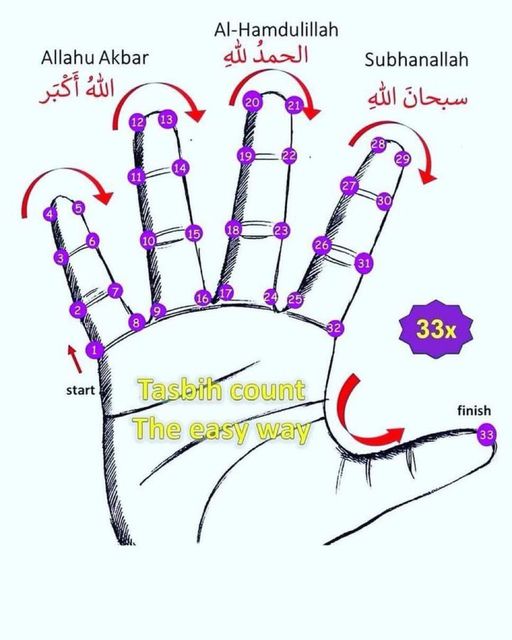Dhikr is one way to keep God in your mind and heart as you go about your day. The word “dhikr” (ذِكْر, also zikr, thikr, zekr, or zikar) is an Arabic word that refers to the act of remembering and glorifying Allah, as well as the prayers used in this act of remembering. Follow along to learn what phrases to chant during this time of prayer, how to pronounce them, and how to properly count as you recite a total of 100 repetitions. By the time you’re done reading, performing dhikr will feel like second nature to you.
- Recite Subhanallah (سبحان الله, “Allah is flawless”) and Alhamdulillah (ٱلْحَمْدُ لِلَّٰهِ, “Praise be to God”) 33 times and Allahu akbar (الله أكبر, “God is the greatest”) 34 times.
- Count each recitation by touching your right thumb to each of the 3 segments on your 5 fingers twice.
- Use a string of 33 prayer beads to keep count if you don’t want to count on your fingers, using 1 bead per recitation
Reciting Dhikr
- If you don’t have enough time, perform dhikr alongside other daily routines, such as working out, commuting to work, or preparing to go to bed.
- If you’ve never performed dhikr before, start with just once or twice a day and work your way up.
- Reflect on what dhikr means to you and your faith and think about what you’re trying to achieve through performing dhikr.
- Keep your intentions pure as you go into performing dhikr. Do it because you want to feel closer to Allah, not because you’re expecting some reward or praise.
- Remember that Allah is always with you and allow your heart to fill with gratitude for everything He does.
3
Say “Subhanallah” 33 times. “Subhanallah” (سبحان الله) is an Arabic phrase that translates roughly to mean “Allah is flawless.” Pronounce it as sub-hanal-lah. Say this phrase out loud or silently in your mind.
- Alternatively, instead of saying the previous 3 chants, recite “Laa ilaaha illallaah wahdahu laa shareekalahu, lahul mulk walahul hamd wa huwa ‘alaa kulli shayin qadeer” 100 times.
- This passage is be translated as: “There is no god worthy of worship except Allah alone, with no partner or associate. His is the Dominion and to Him be praise, and He is able to do all things.”
Counting Dhikr Using Fingers
Keep count with your thumb and fingers on your right hand. Turn your hand so that you are looking at your palm. Then, use your thumb to mark your count on your 4 fingers and your index finger to mark your count on your thumb.[8] While using your left hand is permissible, it is customary to use your right hand while performing dhikr.
Find the segments on your fingers. If you look at your open palm, you will see that each finger is divided into 3 segments; the bottom, middle, and top. Use these segments to keep track of your count when performing dhikr.
Start your count at the bottom segment of your smallest finger. Touch your thumb to the bottom segment of your pinky finger when you say “Subhanallah” for the first time. When you repeat “Subhanallah” for the second time, move your thumb up to the middle segment of your pinkie finger. Finally, move to the top of your finger when you say “Subhanallah” for the third time.
Count back down your pinky finger for 3 repetitions. When you say “Subhanallah” for the fourth time, touch the top segment of your pinkie again. Then, move your thumb down to the middle and bottom segments for the fifth and sixth repetitions.
By the end of this step, you have used your pinky to count 6 recitations of the phrase “Subhanallah”; 2 recitations per finger segment.
Count 6 repetitions on your ring, middle, and index fingers. Once you reach the bottom of your pinky finger, continue counting on your ring finger in the same way. Then, move on to your middle finger and index finger as you chant “Subhanallah” for each segment.
When you reach the bottom of your index finger the second time, you have recited “Subhanallah” a total of 24 times.
Use your index finger to count 9 recitations on your thumb. Start at the bottom segment of your thumb and count 6 recitations, moving up and then down, just like you did on the other four fingers. Then, when your reach the bottom of your thumb, go up one more time to count 3 additional recitations.
Once you’ve finished counting 9 recitations on your thumb, you have recited “Subhanallah” 33 times.
Repeat the process for reciting “Alhamdulillah” and “Allahu akbar.” As you move to the next chant, start back at the bottom of your pinky finger and work your way over to your thumb. When reciting “Allahu akbar,” do 10 repetitions on your thumb instead of 9 in order to recite the full 34 repetitions.
Post Disclaimer | Support Us
Support Us
The sailanmuslim.com web site entirely supported by individual donors and well wishers. If you regularly visit this site and wish to show your appreciation, or if you wish to see further development of sailanmuslim.com, please donate us
IMPORTANT : All content hosted on sailanmuslim.com is solely for non-commercial purposes and with the permission of original copyright holders. Any other use of the hosted content, such as for financial gain, requires express approval from the copyright owners.
 Sri lanka Muslims Web Portal Sri Lanka Muslims News Center
Sri lanka Muslims Web Portal Sri Lanka Muslims News Center

 Donate
Donate


